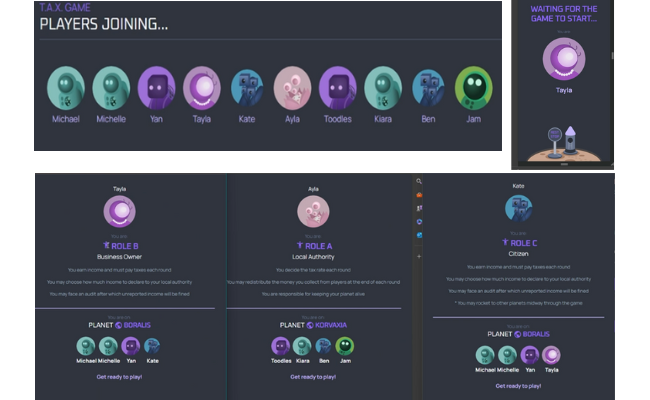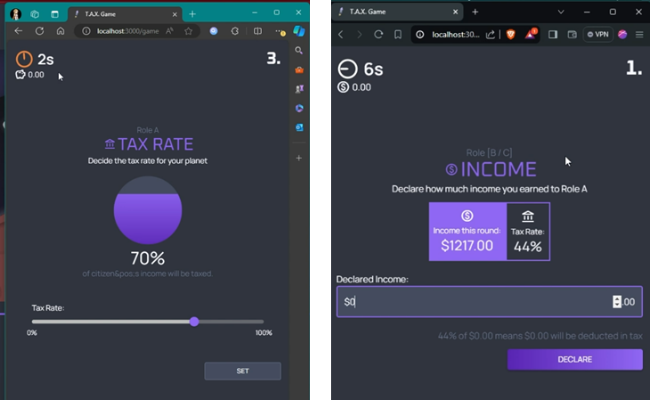A few years ago, Teresa Pidduck attended a conference where she encountered an innovative taxation game. This sparked the development of a similar game for University of Pretoria (UP) students, based on an international collaboration with Anthropo-lab and EDHEC Business School in France. When the original host withdrew, UP seized the opportunity to design its own version of the game, introducing a galactic theme and several flexible features tailored to diverse learning outcomes.
A multidisciplinary approach
The simulation immerses students in the complexities of taxation, economics, finance, politics, sociology, economic policy, psychology, and ethics. The game unfolds in two phases over 12 rounds, during which students assume roles on different planets:
Each round begins with the A-player setting the planet’s tax rate, followed by B- and C-players deciding how much of their income to declare (see Figure 1 for the landing page of the game). Students must balance ethical considerations with personal gain while avoiding planet bankruptcy—a scenario that can occur if the total tax collected falls below a specified amount.
Engaging with taxation in a galactic game
-
The game assigns roles randomly, immersing students in an interactive environment where they are revenue authorities or taxpayers.
-
Players face decisions about income declaration and redistribution, with the risk of audits and penalties looming (see Figure 2 for a view of the gameplay).
-
The game’s toggle features allow the academic team to adjust settings such as penalties, tax rates, and audit chances, enabling the game to be used for different educational levels.
Game mechanics and decision-making
Before the game begins, students are briefed on what to expect. As they engage in the game, they use a galactic interface (see Figure 2), to make timed decisions based on their roles. At the halfway point, the C-players may leave their planet and move to another one in the galaxy. This option creates tax competition, as players compare the tax rates and redistribution policies of different planets.
 Figure 2: A student's view of the gameplay alongside the host's screen, showing participants.
Figure 2: A student's view of the gameplay alongside the host's screen, showing participants.
During each round:
-
A-players set tax rates (see Figure 3),
-
B- and C-players decide how much of their income is to be declared,
-
The game includes a risk of audit, with penalties applied for dishonest declarations.
 Figure 3: The A-player’s opportunity to set the tax rate for the round (left) while B’s and C’s declare income (right).
Figure 3: The A-player’s opportunity to set the tax rate for the round (left) while B’s and C’s declare income (right).
Key lessons and flexibility in design
A unique feature of the UP-designed game is the extensive flexibility it offers, thanks to the toggle functions built into the system. These features allow academics to modify elements like penalties, audit probability, and minimum income levels required to keep a planet running (see Figure 4). Such flexibility has allowed the game to be contextualised for South Africa and used across various student levels.

Figure 4: Toggle features that academic hosts can use to adjust gameplay elements.
Reflection and ethical awareness
After the game, students participate in a debriefing session and reflect on their decisions and ethical considerations. This game provides technical knowledge across various disciplines and the chance to explore ethical issues related to tax evasion, redistribution, and the impact of personal choices on public finances.
Future prospects
The gamified taxation project is more than just a teaching tool. It will be used for PhD research, and future SoTL (Scholarship of Teaching and Learning) papers are planned. The long-term goal is to expand this tool across disciplines and universities, locally and internationally, building stronger educational networks. One student’s remark expresses the overall feeling: "I learned a lot about tax and found the session very valuable overall."
Special thanks to Yan Wong, Michael Tarr, Tayla Orsmond, Andrea Blignaut, Dhairiya Chhipa, and Ross Tordiffe in the game design and development (BIS (Hons) Multimedia lecturer and students involved in the project).
 Figure 2: A student's view of the gameplay alongside the host's screen, showing participants.
Figure 2: A student's view of the gameplay alongside the host's screen, showing participants. Figure 3: The A-player’s opportunity to set the tax rate for the round (left) while B’s and C’s declare income (right).
Figure 3: The A-player’s opportunity to set the tax rate for the round (left) while B’s and C’s declare income (right).
Get Social With Us
Download the UP Mobile App